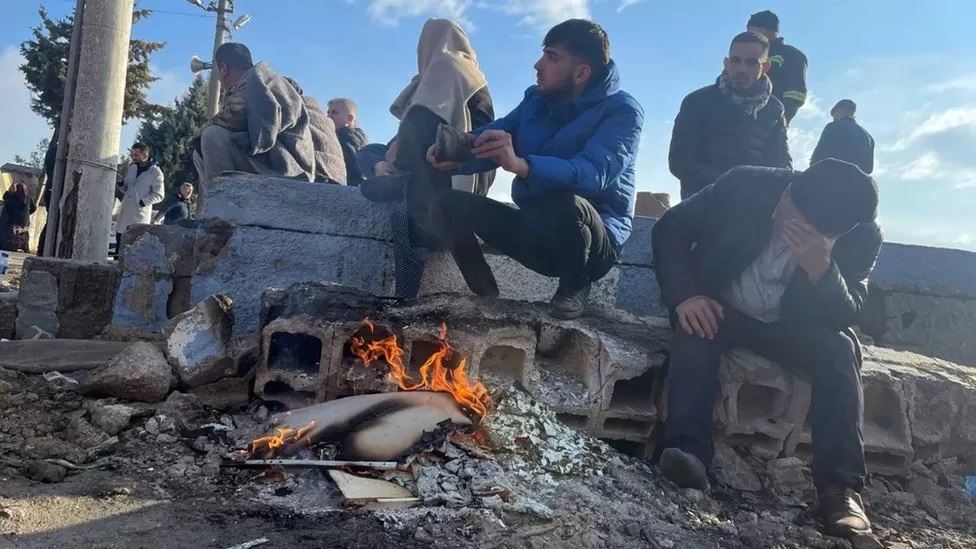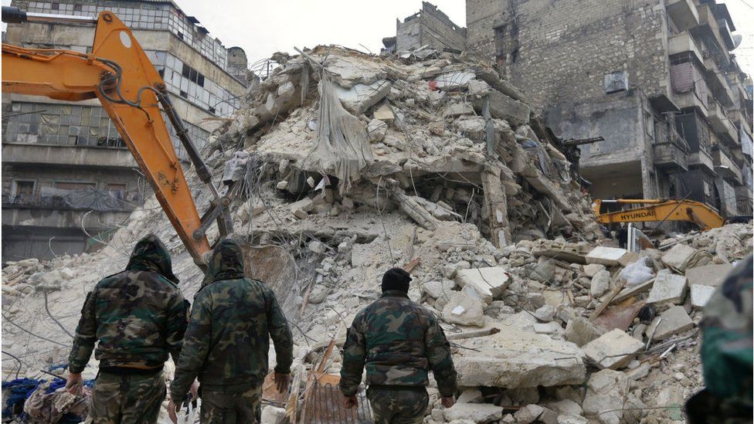Rescuers are battling heavy rain and snow as they race against the clock to find survivors of a devastating earthquake in south-east Turkey.
More than 5,000 people were killed and 15,000 injured in Turkey and over the border in Syria when the quake struck in the early hours of Monday.
The World Health Organization has warned the toll may rise dramatically as rescuers find more victims.
As day broke, rescue teams stepped up their search for survivors.
Heavy machinery worked through the night in the city of Adana, with lights illuminating the collapsed buildings and huge slabs of concrete, in scenes repeated across southern Turkey.
Occasionally the work stopped and a call of "Allahu Akbar" rose up when a survivor was found, or when the dead were recovered.
Adana is full of the homeless - those who lost their homes and others too fearful of aftershocks to return.
Some left without shoes, coats and phone chargers. Temperatures are expected to drop below freezing later this week.
The 7.8 magnitude tremor struck at 04:17 (01:17 GMT) on Monday at a depth of 17.9km (11 miles) near the city of Gaziantep, according to the US Geological Survey.
A later tremor had a magnitude of 7.5 and its epicentre was in the Elbistan district of Kahramanmaras province.
On Tuesday morning, traffic was at a standstill on the main highway to the Turkish city of Maras, close to the epicentre of the quake.
Cars occasionally crawled forward, the wet road illuminated by glowing red brake lights. Few rescuers have made it to this part of southern Turkey yet.
One search and rescue team on their way to the city, their van loaded with specialist equipment and supplies, told the BBC they were eager to start looking for survivors, but they had no idea how bad the devastation would be when they arrived.
Nationally, 8,000 people have been rescued from more than 4,700 destroyed buildings, Turkey's Disaster and Emergency Management Authority (AFAD) said in its latest statement.
As aftershocks continue, rescuers in some areas have been digging through rubble with their bare hands. But freezing conditions are hampering search efforts.
In the southern province of Hatay, the Reuters news agency reported that a woman's voice was heard calling for help under a pile of rubble.
"They're making noises, but nobody is coming," a resident who gave his name as Deniz said while weeping.
"We're devastated, we're devastated. My God... They're calling out. They're saying, 'Save us,' but we can't save them. How are we going to save them? There has been nobody since the morning."
In Hatay, Ghanaian footballer Christian Atsu - who made 107 appearances for Newcastle - was pulled from the rubble of a building with injuries, his manager Mustafa Özat told Turkish radio.
Atsu now plays for Turkish club Hatayspor. The club's sporting director, Taner Savut, is still under the rubble, Mr Özat said.

In the Turkish city of Osmaniye, near the epicentre, pouring rain hampered rescuers. The city was without power as the cold and rain set in.
One family camped on the street, scared of the aftershocks, despite the freezing temperatures. Every time they felt an aftershock, the family moved closer into the middle of the street.
A hotel owner in the city told the BBC that of 14 guests staying that night, only seven had been found.
Countries around the world are sending support to help the rescue efforts, including specialist teams, sniffer dogs and equipment.
But the earthquake has caused significant damage to three airports across Turkey, also creating challenges for aid deliveries.
At least 1,600 people are now known to have been killed in Syria, where millions of refugees live in camps on the Turkish border.
Following an international appeal for help, Turkey's President Recep Tayyip Erdogan said 45 countries had offered support.
The European Union is sending search and rescue teams to Turkey, while rescuers from the Netherlands and Romania are already on their way. The UK has said it will send 76 specialists, equipment and rescue dogs.
France, Germany, Israel and the US have also pledged to help. Russian President Vladimir Putin has offered help to both Turkey and Syria, as has Iran.
Turkey lies in one of the world's most active earthquake zones.
In 1999 a quake killed more than 17,000 in the north-west, while in 1939, 33,000 people died in the eastern province of Erzincan.
This earthquake was powerful enough to be felt as far away as Cyprus, Lebanon and Israel.
(Additional reporting by Antoinette Radford and George Wright in London)
Latest Stories
-
KMA Mayor to resort to instant corporal punishment to decongest the city
10 minutes -
Lands Minister commissions 453 Blue Water Guards, charges them to uphold professionalism
21 minutes -
Eunice Amoo-Mensah: Revolutionising pension funds in Ghana through securities lending
22 minutes -
Madina MP Sosu granted full membership in African Court Coalition
24 minutes -
Blue Origin crew safely back on Earth after all-female space flight
24 minutes -
Supreme Court to begin hearing injunction application against procedure to remove CJ on April 16
25 minutes -
Strong macroeconomy key to sustaining Ghana’s capital market – Stanbic Executive
27 minutes -
African Leaders should respond to the shifting global trade dynamics – WTO DG
35 minutes -
Tamale accounts for bulk of NEDCo’s power losses – Energy Minister
40 minutes -
Modric becomes Swansea ‘investor and co-owner’
47 minutes -
NFL and IFAF host flag football development clinic in Ghana
1 hour -
GAF embark on ‘surgical’ anti-galamsey operations across all 3 commands
1 hour -
K-Pop’s Next Frontier: Africa – How ATEEZ broke barriers just for others to speed ahead
2 hours -
AMA questions Zoomlion fumigation contracts, demands transparency and review
2 hours -
Government initiates comprehensive review of VAT regime – Dr Ato Forson
3 hours

